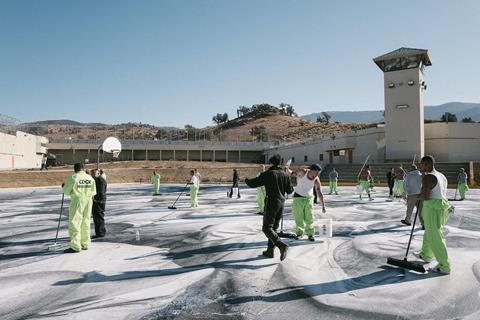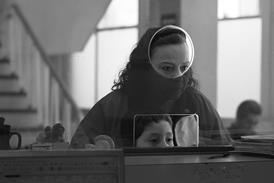French artist JR mounts a large-scale project at the maximum security California Correctional Centre

Dir: JR. France. 2023. 93mins
In the middle of scrubland, surrounded by barbed wire and watchtowers, the maximum security California Correctional Centre looks like the least likely place for a large-scale art project. But French artist JR is not one to shy away from a challenge – he has long used his work to put a human face on inhospitable areas and his previous projects have included pasting images of people on Brazil’s favelas, at the Mexican-US border, on buildings and shipping containers.
Sheds valuable light on the individual stories behind the statistics
In 2019, JR visits the prison with a proposal; to paste a huge image of a group of 40 prisoners on the yard so that, when viewed from above, it looks as though they are peering from a hole. It’s a daring idea and, as this interesting documentary shows, achieved some truly impressive results, both in terms of the artwork and the impact it had on participants.
Playing at IDFA having bowed at Telluride, Tehachapi (which is an extension of JR’s 2019 short film about the project) will immediately appeal to the prolific JR’s fans – a group bolstered by Faces Places, his 2017 road movie made with the late Agnes Varda. There’s a propulsive energy here, driven both by JR’s infectious energy and the interesting cast of inmates he assembles, and the film will likely appeal to both both festival programmers and distributors.
On the face of it, the inmates of the prison — nicknamed Tehachapi after the city in which it is located — are an intimidating bunch. Many are serving life sentences for violent crimes, and there are frequent altercations between rival gangs divided along racial lines. On the day JR arrives, blood is being scrubbed from the prison yard onto which he wishes to paste his artwork; a space he found with the help of Google Maps. (He secures access to the prison via California governor Gavin Newsom, who took part in one of the artist’s murals shown at the San Fransisco Museum Of Modern Art in early 2019.)
JR certainly seems relaxed as he meets the men who have been chosen to participate in the project; a diverse selection of long-term inmates, one of whom, Kevin, sports a swastika tattoo on his face. Circling the table, JR shakes each man by the hand — something that, later in the documentary, many will describe as the most respect they have been shown in years. Treating these men as equals, the endearingly personable JR develops an easy rapport which, together with their creative endeavour, enables them to open up about their experiences.
That’s also because JR plans to feature the installation on his interactive app, giving each man the chance to record their own piece of audio as well as have their picture taken, thus revealing their story to the wider world. The film spends time withKevin, who regrets his past and wants nothing more than to be reunited with his family, and Barrett, whose years spent in the solitary confinement cages have made him reassess his attitude. At times, the film also breaks away from the prison, to talk to family members about the wider effect of incarceration, although these segments are less compelling.
Interspersed with these heavy emotional moments are lighter sequences in which the men work together to assemble the huge collage; much of this is filmed by JR on his phone, giving a raw immediacy to the footage. Later, as the men relax with pizza — for some, the first time they have had it in decades — there is a genuine sense that this project has given them a new focus and will have a lasting impact. (It is worth noting that JR only spends time with the men involved with the project, and does not venture into the wider prison population aside from catching a gang skirmish from a distance.)
This sense of change is borne out when JR returns after the pandemic — which, he says, gave him a new understanding of isolation — for another project, to paste the Californian mountains on the prison walls. Then, he finds that some prisoners have been moved to lower-security wings and that Kevin is being released. While a project like Tehachapi may not be enough to change the world — or even come close to solving America’s huge crime problem — it does shed valuable light on the individual stories behind the statistics.
Production companies: Cine Tamaris, Unframed
International sales: mk2 Films intlsales@mk2.com
Producers: Rosalie Varda, Marc Azoulay, Marco Berrebi
Cinematography: Roberto de Angelis, John Hunter Nolan, Tasha Van Zandt
Editing: Maxime Pozzi Garcia, Sylvie Landra
























